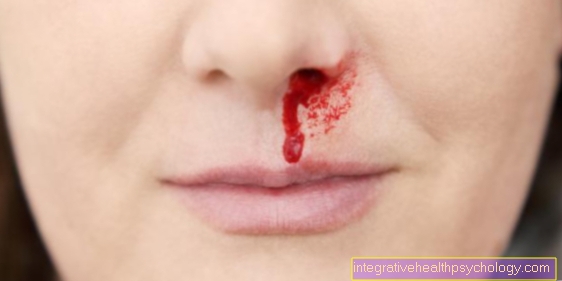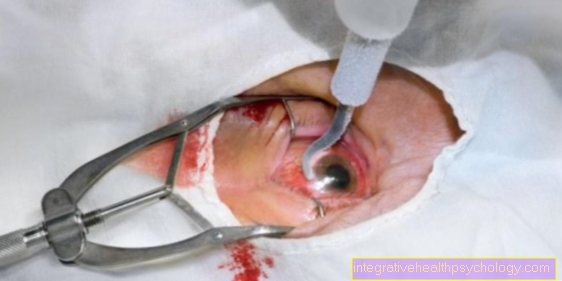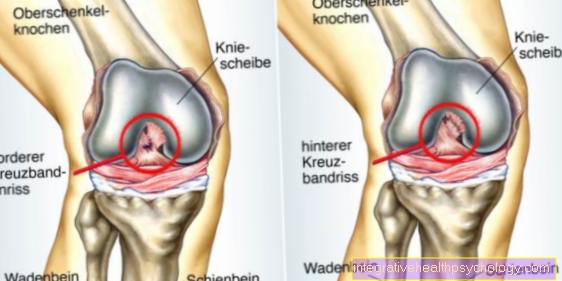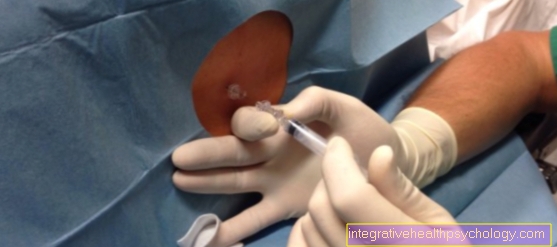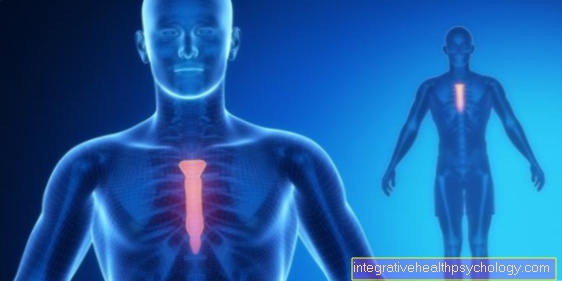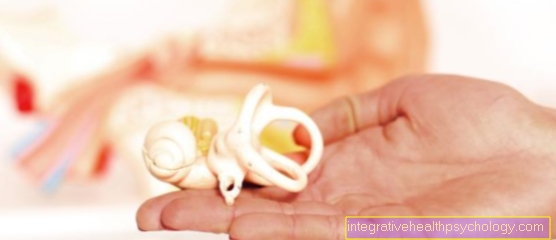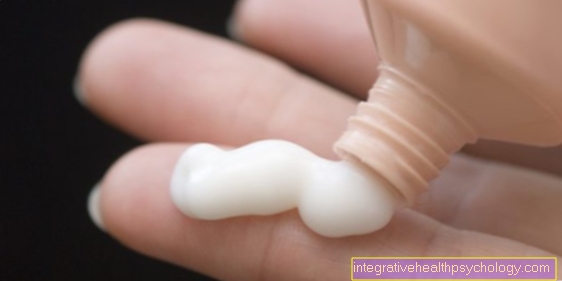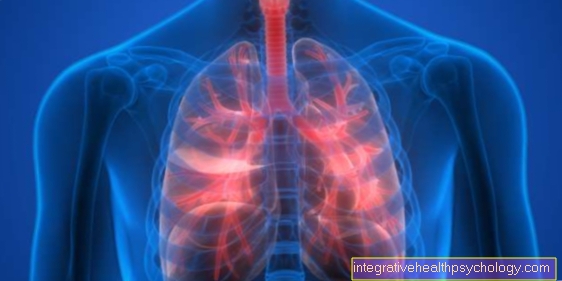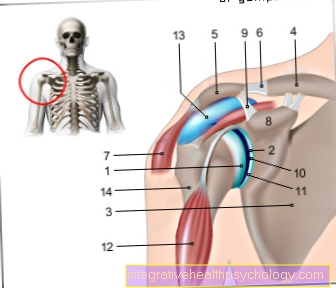Pain relievers for toothache
introduction
Toothache is known to get so intense that it is difficult to keep going.
Fortunately, in these cases you can use painkillers, which not only relieve the pain, but can also reduce inflammation and reduce fever.
This article shows what you should know about the treatment of toothache with the help of painkillers.

Which pain relievers are used for toothache?
Toothache arise from the fact that Nerve fibers get excited. The excitation of nerve fibers can, for example:
- chemical
- thermal or
- mechanical Stimuli happen.
The Neurons then generate an electrical signal and transmit this to the brain via their respective nerve tracts. Here the electrical signal is deciphered and perceived as pain. The sensation of pain is a subjective feeling, which means that the same symptoms can cause different levels of pain in different people.
Toothache is caused by irritation in the tooth located nerve fibers. The responsible nerves come from the fifth Cranial nerve, the Trigeminal nerve. They are ultimately the end branches of its main branches, the Maxillary nerve who is primarily responsible for the upper jaw care and the Mandibular nerve the the Lower jaw nerval about the Inferior alveolar nerve provided. The nerve fibers within a tooth are e.g. chemically through the toxins produced by bacteria at one Caries or irritated by mechanical overload when chewing, causing pain.
Painkiller (Analgesics) have the task of having an analgesic effect and thus suppressing the sensation of pain. Be differentiated opiod analgesics and non-opiod analgesics.
Opiod analgesics work in the Central nervous system (brain + Spinal cord). Non-opioid analgesics act peripherally and not in the central nervous system.
The common pain relievers for toothache like Ibuprofen, Acetylsalicylic acid (ASS 100), and Paracetamol belong in this group. The maximum daily dose for adults is 2,400 milligrams (mg) per day. In the event of an overdose, painkillers have a toxic effect and can e.g. to Liver damage, coma and even lead to death. For this reason, pain relievers should only be taken in the long term in consultation with a doctor. In general, it can be said that pain medication should be taken at regular intervals throughout the day if necessary.
The most popular pain reliever for toothache is ibuprofen. The great advantage of ibuprofen is that it is pain reliever (analgesic), anti-inflammatory (anti-inflammatory) and antipyretic (antipyretic) works. What is important here is the additional anti-inflammatory effect that toothache is often associated with inflammatory reactions.
Ibuprofen up to 400 mg is freely available in pharmacies. The maximum daily dose is 1200 mg for children up to 15 years of age and 2400 mg for adults. In rare cases, the mechanism of action can lead to side effects such as inflammation of the gastric mucosa or even kidney infections.
Read more on the topic: Ibuprofen for toothache
Acetylsalicylic acid (aspirin) has analgesic, anti-inflammatory, antipyretic and, what is important, it is an anti-platelet agent. This means that the blood does not "clump" as quickly as normal and that you bleed longer if you are injured.
One advantage of ASA is that it works quickly after about 15 minutes. ASA should not be used in children under 16 years of age with febrile illnesses, and women should only take small amounts of ASA during pregnancy. In high doses, ASA can lead to acidification of the organism, which can lead to respiratory paralysis and unconsciousness.
Read more on the topic: Aspirin®
The analgesic Paracetamol has a pain reliever and antipyretic character. The maximum daily dose of paracetamol is 60 mg / kg Body weight. Paracetamol is about the liver reduced. Overdosing can thus lead to liver damage up to Liver failure cause.
In summary, the pain reliever at Toothache are effective and helpful for short-term pain relief. The following applies to toothache Ibuprofen, as long as there is no intolerance, as the remedy of choice. However, pain killers should not be used to avoid a visit to the dentist, but only to bridge the time until then.
Pain is always a warning signal from the body that something is wrong. For this reason, if a toothache persists for a long time, a visit to a doctor is recommended in any case. When taking painkillers, attention should be paid to the side effects and the maximum daily dose should be observed.
Painkillers

Acute toothache can initially be caused by the Taking various pain relievers be alleviated. In this context, the application of Ibuprofen or Paracetamolcontaining pain pills proved to be particularly effective. The effectiveness of these pain relievers relies primarily on one Inhibition of cyclooxygenase (short: COX I and COX II), an enzyme that catalyzes the synthesis of various pain mediators. This way the toothache will be suppressed at the point of origin.
Pain tablets that contain the active ingredient paracetamol are also unable to do this contain inflammatory processes. This fact is the clear advantage of pain therapy with ibuprofen-containing painkillers. In contrast to paracetamol, the active ingredient ibuprofen has one Influence on the development and maintenance of inflammatory processes in the field of teeth (Anti-inflammatory effect). The use of painkillers for the acute treatment of toothache should, however only for a short period of time occur.
Affected patient must be aware in this regard that the real cause of the toothache not fixed this way can be. The See a dentist is also inevitable when the symptoms decrease when taking painkillers.
The pain reliever known under the name aspirin can theoretically be used in the form of painkillers for the short-term therapy of toothache. However, since this active ingredient has an inhibitory effect on the function of the blood platelets and in this way reduces blood clotting, its use in toothache is rather questionable. Serious incidents can occur during dental therapy due to the increased tendency to bleed. Often the dentist's view of the treatment area is so restricted after taking aspirin that adequate therapy is hardly possible.
Over-the-counter pain relievers
Mild toothache can in most cases already be avoided by taking it lighter pain medication be alleviated. You can use analgesics such as acetaminophen, ibuprofen, or aspirin without a doctor's prescription, so can be purchased without a prescription.
In addition are various combination preparations Available in pharmacies without a prescription. These painkillers are usually compositions of different active ingredients. In the treatment of acute toothache, however, you can avoid taking these over-the-counter combination products not advised. A exact dosage The most suitable active ingredients for the therapy of toothache is more difficult to adhere to when using combination products.
Paracetamol
The Taking paracetamol arises in the presence of a toothache as effective first measure Nevertheless, the affected patient should be aware that the actual cause of the toothache is also reflected in the Use of paracetamol or alternative pain relievers can not be fixed. For this reason, the timely visit of a dentist should not be neglected. Patients unable to take paracetamol can seek acute pain relief alternative pain relievers take in.
To temporary treatment of toothache are also suitable in addition to the common paracetamol Ibuprofen-containing analgesics. On taking aspirin should be avoided if you have a toothache. This fact can be explained by the fact that aspirin, unlike paracetamol, is one Influence on blood clotting Has. Through an irreversible inhibition of the Platelets-Function, the blood clotting is inhibited when using aspirin. This represents at the latest when you visit the dentist a serious problem. Depending on the cause of the development of the toothache, it can increase during treatment heavy bleeding come. In case of doubt, this bleeding can restrict the view of the treatment area to such an extent that adequate therapy is almost impossible.
In addition to the common active ingredients paracetamol and ibuprofen, a Range of alternative pain relievers serve to relieve acute toothache. Depending on the cause of the toothache, you can already use simple home remedies such as Caraway seed oil, tea tree oil, or cinnamon oil contribute to relief. These more alternative pain relievers have been used so far especially with teething children Proven useful. In most cases, toothache in adults can only be relieved to a limited extent in this way. In the treatment of toothache in adults, alternative pain relievers should mainly be used Juniper and coltsfoot base be helpful.
A Infusion of juniper leaves, coltsfoot leaves and juniper berries is primarily intended to help against throbbing toothache. In addition, such infusions are said to have antibacterial properties. Taking paracetamol at mild, throbbing toothache should be sociable this way. Other alternative pain relievers for toothache consist of a mixture of different herbs. Ready-made herbal mixtures are exposed peppermint, sage, Johannis herbs and valerian together and can in pharmacies and health food stores can be acquired. In addition, some patients swear by the use of cloves to treat mild toothache. By biting a clove as an alternative pain reliever, the pain is supposed to be relieved even without the use of potent analgesics how acetaminophen can be alleviated. In this context, however, it must be noted that toothache is caused by Nerve damage arise, in this way even be reinforced.
Dolomo
The drug Dolomo is a Combination preparation, which is prescribed for severe pain. It consists of a mixture of the common active ingredients Paracetamol and Acetylsalicylic acid (ASS). As a result, Dolomo is known for its rapid onset of action, which often only lasts a few minutes. In the pack are blueness and white tablets contain. The white tablets also contain Caffeine and are to be taken during the day. The blue tablets contain Codeine, an opioid that can be addictive if taken in excess. These should be taken at night.
The dosage of the pain medication should be observed as follows: Adults and children over 12 years of age are allowed to take 1-2 white tablets during the day, a maximum of 3 times a day. The time interval for taking should not be less than 6 hours.
The blue tablet should be taken half an hour before going to bed and can be taken repeatedly once during the night. For an individual dosage this is respective order of the dentist however to be considered. In addition, consultation with the dentist is essential when taking other medications Contraindications to avoid. It is important that when taking the pain preparation Dolomo that Reactivity severely restricted and those affected should no longer actively participate in road traffic.
Dizzy spells are possible. Common side effects face Stomach discomfort, nausea and Vomit, such as heartburn In the last trimester of pregnancy, the use of Dolomo is strongly contraindicated, that is, the drug must not be taken as it can lead to severe complications. The active ingredient codeine from the blue tablet can cross the placental barrier and to Breathing disorders of Embryos to lead. There have also been reports of withdrawal symptoms in children, as opioids Addictive behavior to produce. It is also not advisable to take pain medication during breastfeeding, as the active ingredients can enter the child's circulation via breast milk and thus damage it.
Anti-inflammatory pain relievers
The range of painkillers is wide. When it comes to toothache, pain relievers are prescribed that have an anti-inflammatory side effect.
Most of the conditions for which pain killers are prescribed in the dental office are Inflammatory diseases. Therefore, the anti-inflammatory side effect is beneficial for pain relief and thus the success of the therapy. Well known anti-inflammatory agents are Ibuprofen, Naproxen, Piroxicam or Felbinac. These anti-inflammatories fight the body's own inflammatory response by stopping the production of Prostaglandins prevent. This Messenger substances of the own body have an influence on the development of pain and the body's own pain control of the immune system.
It is important to understand that the anti-inflammatory drugs intervene strongly in the body's own processes and thereby also Side effects cause. Those affected often complain Stomach discomfort when taking this group of drugs as these are the Attack stomach lining and at worst to one Gastric ulcer being able to lead. People with kidney problems should be careful with ingestion, as excessive consumption can severely damage the kidneys. Also Asthma attacks and Heart trouble are possible side effects, which is why the dosage must be discussed with the dentist.
Home remedies
Mild toothache doesn't have to go through that Taking potent pain relievers be treated. In many cases, the use of simple home remedies is sufficient to provide relief to the affected patient.
Among the most popular Home remedies for toothache belong various herbal vapors. Acute toothache can be made more specific by treatment Juniper and Coltsfoot existing vapors can be alleviated. In this way, it is often possible to dispense with taking potent painkillers altogether. When using these herbal mixtures, however, care must be taken that the resulting steam only in the mouth is recorded. To avoid burns should use the herbal fumes never inhaled become.
In addition, special teas are made peppermint, Johannis herbs and Lemon balm as simple home remedies to help effectively relieve toothache without pain relievers.
Another popular home remedy for acute toothache is that Clove. To avoid taking common pain relievers like ibuprofen or paracetamol, one should use a clove Chewed as close to the affected tooth as possible become. In addition, poultices filled with heated cloves are said to help relieve toothache. In this context, however, it should be noted that toothache is directly related to a Nerve damage are due (if there is a Pulpitis) can even be intensified by the strongly irritating clove juice. Pulpitis is an inflammation of the tooth pulp.
Since toothache in general is often due to the Presence of inflammatory processes can be traced back, too high percentage of alcohol can be used as home remedies. The affected patient should not drink this, but only the Rinse the oral cavity with it. Because alcohol can also trigger toothache. Read about this: Toothache after consuming alcohol
Toothaches in young children, on the other hand, are in many cases due to the breaking through Milk- or permanent teeth. In order to alleviate the resulting discomfort, a piece of apple can be placed in a chilled washcloth on the painful jaw region.
In addition, are suitable warm onions not just to alleviate Earache. Wrapped in a thin kitchen towel, the heated onions can be placed on the cheek in the area of the painful tooth. Onion vapors are said to help relieve toothache without taking additional painkillers.
pregnancy
As the pain reliever of choice in the pregnancy Paracetamol applies. It doesn't matter what kind of pain it is about. The advantage of the active ingredient paracetamol is the fact that it can also be used during pregnancy at the permissible dosage taken without restriction may be.
However, it should be noted in this context that this active ingredient is also capable of doing this via the umbilical cord into the child's organism to get. For this reason, high doses that are taken over a long period of time should be taken during pregnancy avoid.
A Overdose or even abuse this pain reliever can become severe even during pregnancy Liver damage of the unborn child.
From taking aspirin (ASA, acetylsalicylic acid), on the other hand, is strongly discouraged during pregnancy. The reason for this is the fact that the active ingredient is capable of doing an important one Bypass route in the child's bloodstream (Ductus Botalli) to close prematurely. In addition, salicylates like aspirin have one inhibitory influence on labor.
Also pain killers over the counter Active ingredient ibuprofen should not be taken if there is a toothache during pregnancy.
Since ibuprofen is also a crucial one Influence on the closure of the ductus Botalli and the onset of labor is allowed No use from the 30th week of pregnancy at the latest of this pain reliever.
In general, you should never take painkillers during pregnancy out of your own motivation, regardless of the active ingredient. In order not to endanger the well-being of the mother-to-be and the unborn child, all painkillers must be taken discussed with a doctor or pharmacist become.
Painkillers don't help
Many people with toothache are quick to resort to pain medication. The topic resistance is known to many especially in connection with antibiotics. However, keep kicking Intolerances against pain medication. It is quite conceivable that excessive consumption of a type of medication could result in resistance or even intolerance up to and including allergy can form.
It is known that the body after longer periods of use Habituation effects developed and the Intensity of action from painkillers to complete ineffectiveness decreases. Doctors speak of a so-called Pain memory. The brain internalizes pain and its intensity and evaluates this experience. Long-term use of medication can change the activity of the nerve cells and thus change entire nerve cords and pathways in such a way that drugs work less or not at all.
The fact that a pain medication no longer works doesn't have to last forever. After a longer break in taking it, it is quite possible that the drug will work again completely, as the habituation effect subsides.
Another common example where pain relievers almost don't work at all is the case of one empty alveolus. When a tooth is pulled, it is formed in the empty one Tooth socket, the alveolus Blood clot. These blood cells in the plug gradually transform into other tissue cells and the wound closes. If this plug does not form, for example due to excessive washing around the mouth or premature smoking, the alveolus is bloodless and therefore the bone below the gums each Exposed to infection. If he becomes infected, severe pain can occur and pain medication usually does not help because the healing is manifested locally on the bone in the alveolus.
Most pain relievers do not penetrate the bones and therefore do not reach the pain focus. Cases are rare, but also conceivable, in which patients complain of short intervals with incredibly intense pain in the area of the teeth, cheeks and the entire face. Doctors speak of one Trigeminal neuralgia, in which the fifth cranial nerve, the trigeminal nerve, sends out constant and irregular painful sensations. Since these pain attacks are very short-term, but all the more intense, the usual pain medication cannot work at all, as the time until the effect occurs exceeds the actual pain time. If trigeminal neuralgia is diagnosed, a walk to the Pain specialists inevitable.








